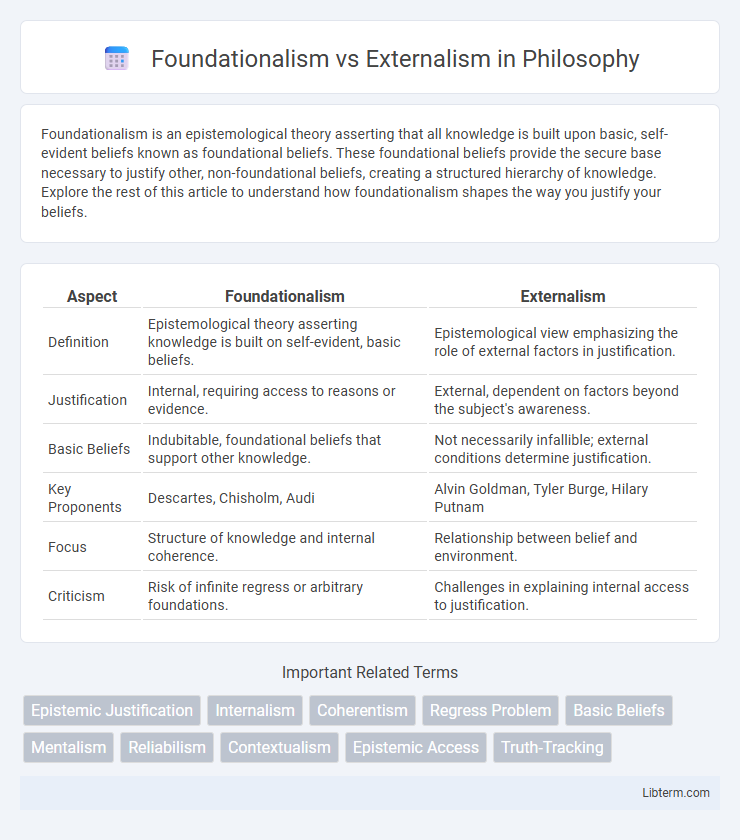Foundationalism is an epistemological theory asserting that all knowledge is built upon basic, self-evident beliefs known as foundational beliefs. These foundational beliefs provide the secure base necessary to justify other, non-foundational beliefs, creating a structured hierarchy of knowledge. Explore the rest of this article to understand how foundationalism shapes the way you justify your beliefs.
Table of Comparison
| Aspect | Foundationalism | Externalism |
|---|---|---|
| Definition | Epistemological theory asserting knowledge is built on self-evident, basic beliefs. | Epistemological view emphasizing the role of external factors in justification. |
| Justification | Internal, requiring access to reasons or evidence. | External, dependent on factors beyond the subject's awareness. |
| Basic Beliefs | Indubitable, foundational beliefs that support other knowledge. | Not necessarily infallible; external conditions determine justification. |
| Key Proponents | Descartes, Chisholm, Audi | Alvin Goldman, Tyler Burge, Hilary Putnam |
| Focus | Structure of knowledge and internal coherence. | Relationship between belief and environment. |
| Criticism | Risk of infinite regress or arbitrary foundations. | Challenges in explaining internal access to justification. |
Introduction to Foundationalism and Externalism
Foundationalism asserts that knowledge is built upon basic, self-evident beliefs serving as a secure foundation for further justified beliefs. Externalism emphasizes that the justification of a belief depends on factors external to the cognitive access of the believer, such as the reliability of the belief-forming process. Both theories address the structure of epistemic justification but differ in how foundational beliefs or external factors contribute to knowledge.
Historical Context and Philosophical Roots
Foundationalism, rooted in ancient philosophy with figures like Aristotle, posits that knowledge is structured upon basic, self-evident beliefs serving as the foundation for all other knowledge. Externalism emerged prominently in 20th-century epistemology, influenced by philosophers such as Alvin Plantinga and Hilary Putnam, emphasizing that justification depends not only on internal states but also on factors external to the subject's awareness. The historical development of foundationalism reflects a focus on epistemic certainty and internal justification, whereas externalism arose to address challenges posed by skepticism and the limits of introspective access to knowledge sources.
Defining Foundationalism: Core Principles
Foundationalism asserts that knowledge and justified belief rest upon a base of self-evident, infallible beliefs known as foundational beliefs. These core principles emphasize that all non-foundational beliefs derive their justification from direct relations to these secure, basic beliefs. Foundationalism contrasts with externalism by focusing primarily on the internal structure and certainty of justification rather than external factors.
Understanding Externalism: Key Concepts
Externalism in epistemology asserts that the justification of a belief depends on factors external to the subject's mental states, such as the reliability of the belief-forming process or the relationship to the external world. Key concepts include the role of environmental factors, the accessibility or inaccessibility of justification to the subject, and the emphasis on truth-conducive mechanisms. This approach contrasts with Foundationalism by rejecting the necessity for beliefs to be internally accessible or infallible to serve as a foundation for knowledge.
Major Differences Between Foundationalism and Externalism
Foundationalism asserts that knowledge is built on basic, self-evident beliefs that provide justification for other beliefs, emphasizing internal justification accessible to the subject. Externalism, by contrast, argues that justification depends on factors external to the subject's cognitive access, such as the reliability of the belief-forming process or environmental conditions. The major difference lies in the source of justification: foundationalism demands internal cognitive access to justificatory reasons, while externalism allows justification based on external factors beyond the subject's awareness.
Arguments Supporting Foundationalism
Foundationalism argues that knowledge is structured like a building, with basic beliefs serving as the secure foundation upon which other beliefs rest. These basic beliefs are self-evident, infallible, or evident to the senses, providing epistemic justification without relying on other beliefs. This framework addresses the regress problem by stopping infinite justification chains, ensuring that knowledge claims are grounded in indubitable foundations.
Critiques and Challenges to Foundationalism
Foundationalism faces critiques centered on the arbitrariness of its basic beliefs, which are often challenged for lacking sufficient justification or being self-evident. Critics argue that foundationalism struggles with the regress problem, as its foundational propositions may still require support, undermining their certainty. Additionally, externalist perspectives highlight that foundationalism neglects the role of external factors, such as environment and cognitive processes, in justifying beliefs.
Arguments for Externalism in Epistemology
Arguments for externalism in epistemology emphasize the necessity of factors outside the subject's cognitive perspective, such as reliability and the environment, to justify knowledge claims. Externalism contends that knowing depends on the truth-tracking process or the causal connection between belief and fact, which cannot be fully accessed internally. This approach addresses skepticism by grounding justification in objective conditions rather than solely on introspective access to reasons or evidence.
Criticisms and Limitations of Externalism
Externalism in epistemology, which posits that justification depends on factors outside an individual's mental states, faces criticisms related to the accessibility of justificatory conditions, making it difficult for subjects to assess their own knowledge. Critics argue this reliance on external conditions compromises internal cognitive access, potentially disconnecting justification from conscious awareness or reflection. Furthermore, externalism struggles to account for cases where subjects have reliable cognitive processes but lack epistemic insight, challenging its comprehensiveness in explaining knowledge acquisition.
Contemporary Debates and Future Directions
Contemporary debates in epistemology emphasize foundationalism's insistence on basic, self-evident beliefs as the bedrock of knowledge versus externalism's reliance on factors outside the agent's awareness, such as reliability of cognitive processes. Recent discussions prioritize integrating externalist intuitions with foundationalist structures, exploring hybrid models like internalist-foundationalism or a form of contextual externalism to resolve persistence issues in epistemic justification. Future directions concentrate on applying these frameworks to cognitive science advancements, virtual epistemic environments, and AI epistemology to enhance understanding of knowledge acquisition in dynamic, technologically mediated contexts.
Foundationalism Infographic

 libterm.com
libterm.com